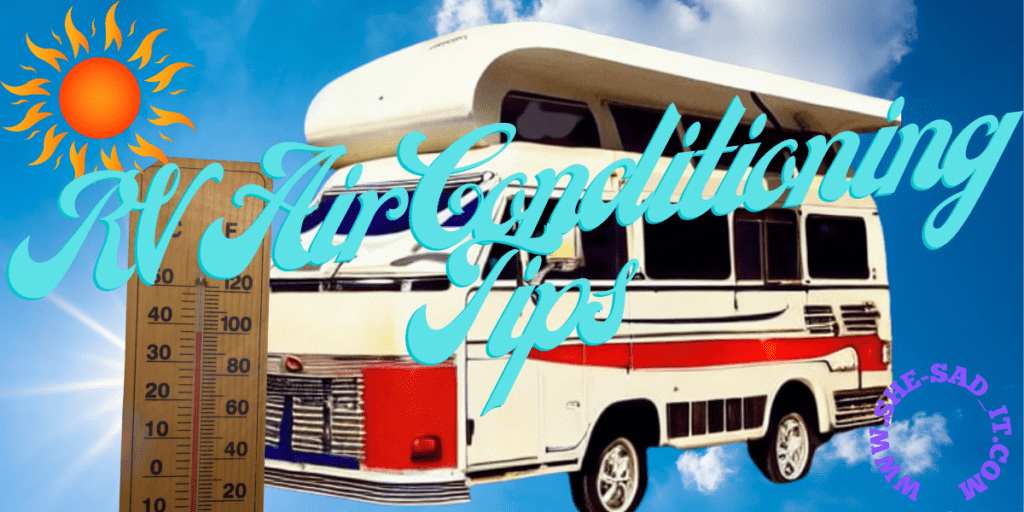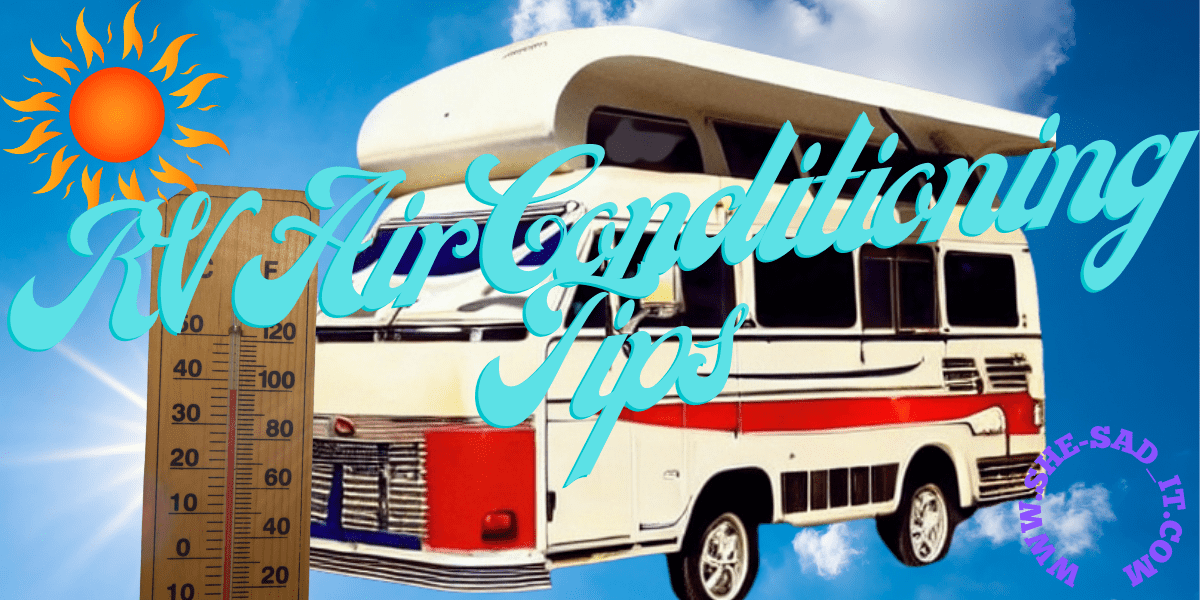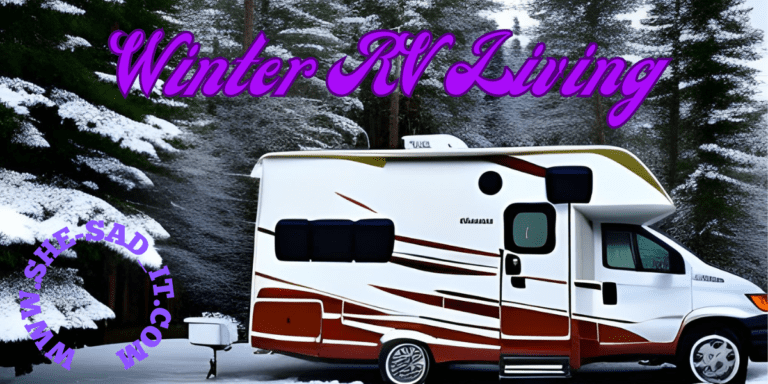Summer Is Around the Corner: RV Air Conditioning Tips

Introduction
Summer is just around the corner, and for many of us, that means hitting the open road in our trusty RVs. But nothing can put a damper on a great road trip quite like a malfunctioning air conditioner. Let’s face it, nobody wants to spend their vacation sweating it out in their RV! That’s why it’s important to take some simple steps to ensure your RV air conditioner is in top shape before you hit the road. In this post, we’ll share some tips and tricks to help you keep your cool during your next summer adventure. So sit back, grab a cold drink, and let’s dive into some RV AC maintenace and tips!
Keep Your RV Air Conditioner in Tip-Top Shape with These Easy Maintenance Tips!
Whether you’re full time RV dwelling or out for a weekend with the family, there’s not much worse than being stuck in a hot RV with a busted air conditioner during the scorching summer months. That’s why it’s essential to give your RV air conditioner some TLC before you hit the road. Follow these camper air conditioning tips for proper cleaning and maintenance of your unit can help prevent breakdowns, ensure optimal performance, and keep you and your family cool and comfortable on your next adventure. Here are some rv ac tips to help things run smoothly this summer:
- Check and Replace Filters: The first step in maintaining your RV air conditioner is to check and replace the filters regularly. Clogged filters can cause your unit to work harder, leading to decreased efficiency and even system failure. There should be a filter on the inside portion of Your AC unit.
- Clean the Coils: Dirty coils can also impede airflow and cause your air conditioner to work harder than necessary. Use a soft-bristle brush or a fin comb to gently remove any debris or buildup from the coils.
- Clean the evaporator:
- Inspect the Ducts: Finally, be sure to inspect the ducts for any damage or leaks. If you notice any issues, be sure to address them before hitting the road.
Here’s a great youtube video I found that shows you how to open and clean the roof top AC most RVs have. It’s actually got some great tips for other things we should be doing to our RVs.
Check Your AC Unit For Leaks And Damage
One of the essential aspects of maintenance is checking for leaks and damage in your RV AC. Leaks and damage can significantly impact the performance of your RV air conditioner, leading to decreased efficiency, increased energy consumption, and costly repairs.
A leaking RV AC can cause a significant reduction in the cooling capacity of the system, making it less effective in keeping your RV comfortable during hot weather. Additionally, leaks can cause the refrigerant to escape, leading to decreased efficiency and increased energy consumption. Damage to the unit can also cause airflow problems and increased noise levels, resulting in a less comfortable environment in your RV.
To inspect your RV air conditioning unit for leaks and damage, start by checking for cracks or other signs of damage in the housing of the AC unit. Also, examine the refrigerant lines for leaks and ensure that all connections are tight and secure. You can use a refrigerant leak detector to detect any leaks. Additionally, inspect the fins on the AC unit’s condenser and evaporator coils for damage and clean them of any debris. Regular inspections and maintenance of your RV AC unit can save you money on costly repairs and extend the lifespan of your air conditioning system.
Prepare your RV Air Conditioner For Summer Time – Quick Easy Checklist
To help you stay cool and comfortable during those hot summer days, here’s a quick and easy checklist for preparing your RV’s AC:
- Check your filters: Start by cleaning or replacing your RV’s air filters. This ensures that your AC unit is running at its maximum efficiency and won’t get bogged down by dust and debris.
- Inspect your ducts: Make sure your RV’s air ducts are free of any obstructions or damage. Blocked or damaged ducts can restrict airflow and prevent your AC from cooling your RV effectively.
- Examine the vents: Take a look at your RV’s air vents and make sure they’re open and free of any blockages. Dust and debris can accumulate in these areas and reduce airflow.
- Check your coolant levels: Low coolant levels can cause your RV’s AC to malfunction, so make sure your coolant levels are topped up before the hot summer months arrive.
- Test your unit: Finally, turn on your RV’s AC unit and let it run for a while to make sure it’s working correctly. If you notice any strange noises or poor airflow, it may be time to get your AC unit serviced by a professiona
RV Air Conditioning Tips and Tricks To Keep Your Space Cooler
Are you tired of feeling like a hot potato when you’re camping in the summer months? Well, fear not, because we’ve got some rv air conditioning tips and tricks to help you keep your RV cooler, so your AC won’t have to work so hard!
- Get shady: Park your RV in the shade whenever possible. This will help keep the sun’s rays from heating up your RV, which can make it feel like a sauna.
- Ventilate, ventilate, ventilate: Use your RV’s vents and windows to create a cross-breeze. This will help circulate cool air throughout your RV, which can make a huge difference in how comfortable you feel.
- Insulate: Add insulation to your RV’s windows, doors, and walls. This will help keep cool air inside your RV and prevent hot air from seeping in.
- Use awnings: Invest in a good set of awnings for your RV. These can help keep the sun’s rays from directly hitting your RV, which can make a big difference in how hot it gets inside.
- Cook outside: Avoid cooking inside your RV as much as possible. Cooking generates a lot of heat, which can make your AC work harder. Instead, set up an outdoor kitchen and enjoy the fresh air while you cook.
- Stay hydrated: Finally, make sure you and your fellow RVers stay hydrated! Drinking plenty of water will help you stay cool and comfortable, even when the temperatures are soaring.
Can You Run an AC using solar and batteries?
The question of whether it’s possible to run an air conditioning unit using solar and batteries gets asked in almost all the RV groups I’m in. The short answer is yes, it is possible, but it’s not as simple as just plugging your AC into a solar panel and a battery.
The first thing to consider is the amount of power an air conditioning unit requires. AC units are notorious for being power-hungry appliances, and they can easily consume more power than a solar panel and battery can provide. To run an AC unit using solar and batteries, you’ll need to make sure you have enough solar panels and batteries to meet the power requirements of your AC unit.
The second thing to consider is the type of AC unit you have. There are two main types of AC units: window units and central air conditioning systems. Window units are easier to power using solar and batteries because they require less power than central air conditioning systems. However, central air conditioning systems are more efficient and can cool larger spaces, so they may be a better option for some RVs or off-grid homes.
Assuming you have the right amount of solar panels and batteries and the right type of AC unit, the next thing to consider is how to connect everything. You’ll need an inverter to convert the DC power from your batteries to AC power that your AC unit can use. You’ll also need a charge controller to regulate the flow of power from your solar panels to your batteries. I recommend getting something called a ‘soft start’.
It’s important to note that running an AC unit using solar and batteries is not a set-it-and-forget-it solution. You’ll need to monitor your power usage and make adjustments as necessary to ensure you don’t run out of power. This may mean turning off other appliances or devices when you’re running your AC unit, or it may mean investing in more solar panels or batteries to increase your power capacity.
Another thing to consider is the cost. While running an AC unit using solar and batteries can save you money on your energy bills in the long run, the upfront cost of installing solar panels and batteries can be significant. You’ll need to weigh the cost of installation against the potential savings over time to determine whether it’s a worthwhile investment for you.
Conclusion
I am the first to admit that I’m not the best at keeping up with regular maintenance on things in my RV. I just ordered all the items from the list below and I’m going to actually do this AC maintenance that I prescribed! WE are in this together friends. An ounce of prevention is worth a pound of cure they say. Bye Bye Winter!!! Hello Summer.
Quick Shopping List
Please note by clicking the links here i get a small affiliate percentage. It doesn’t cost you a penny and it’s the only thing keeping this site alive! Please like and share if you thought this was helpful.





Here are a couple of my other popular blog posts you might want to read..
Wondering the best water filter system for your rv?







